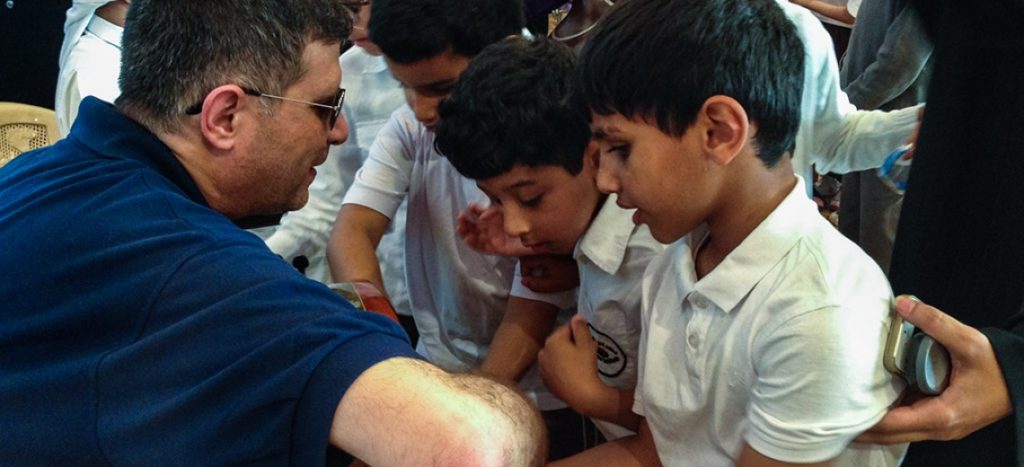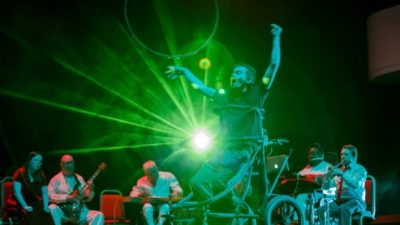British Paraorchestra’s Producer, Sarah Hickson reflects on a recent tour in Qatar and offers some tips to other companies on how to minimise the problems inherent in international touring.

The British Paraorchestra on tour in Qatar
The British Paraorchestra has a pioneering spirit, so when Ogilvy and Mather contacted us on behalf of their clients Sasol (a global energy and petrochemical company) about a project in Qatar, we leapt at the opportunity. As a producer and arts manager with many years of international and cross cultural experience, I was confident we could take this on and manage it successfully, although I also realised that it would be an ambitious leap for us as an organisation and a learning curve for some of the Paraorchestra musicians.
We were a touring party of 35 for this trip – 19 musicians, 11 carers/sighted assistants/partners, Charles Hazlewood (the Paraorchestra’s Artistic and Music Director), and four members of the management/technical team. Our luggage included a long-necked Baroque lute, a sitar, an Irish harp and 43 harmonicas, alongside more regular orchestral instruments such as flutes, trumpets and viola. Amongst the group were seven musicians who are wheelchair users.
The list that follows is a personal perspective on our trip – things which I think could be useful for companies and artists planning an international tour, or to organisations hosting Deaf and disabled artists and companies with diverse access needs. The list is by no means exhaustive, and many of the points I raise are, of course, applicable to touring in general. Much of it is practical and logistical.
16 tips towards stress-free international touring
- Make lists I like lists. They came into their own on this trip. Some of the lists I made were:
- musical instruments (model, serial number, size/weight)
- luggage (including what HAS to travel in the cabin)
- dimensions and weight of wheelchairs
- passenger seating requirements
- extra seats required for instruments
- essential medical items
- medical emergency details and prescriptions
- emergency contact details
- passport details
- travel insurance documentation
- hotel room requirements
- dietary requirements.
- Meet with the airline duty manager before departure
- Check customs clearance requirements when travelling outside the EU
- Ask the airline for dedicated check-in desks
- Ask everyone to be at the gate at least one hour before scheduled departure
- Ask the promoter to book airport VIP Services for your arrival
- Do a recce visit before the tourThis is especially important if you are working somewhere that is not used to dealing with diverse access requirements. For budgetary reasons, I wasn’t able to do a recce to Doha, which meant that there were a lot of arrangements to check on arrival:
- identify and agree the simplest dropping-off point at venues. Does the driver know where they are?
- check the route from the dropping-off point to the venue entrance
- check ramps, measure width of doors, look for trip hazards, etc.
- check and label dressing rooms, find keys if necessary, check for chairs, table, clothes rail, hangers, etc., in each dressing room
- check the location and number of accessible toilets
- check route to stage
- catering facilities and staff at the venue – check they have a copy of the schedule, and know when the breaks are, etc.
- meet with the hotel manager and go through the rooming list
- check accessibility requirements in the rooms – especially the bathrooms
- ensure that the restaurant manager understands what is being paid for by the promoter and what are ‘extras’ to be charged to the individual. Otherwise you will end up with a lot of messy bills to sort out on departure
- run through the dietary requirements with the chef and restaurant manager, so that they understand the nature of the restrictions
- check that the accessible transport really is accessible, that the drivers know how to operate the lift mechanism and how to secure the wheelchairs, and that the dimensions needed for the wheelchair users have been taken into account (especially height clearance)
- Ask for a hotel room list to be printed out for your arrival and for the front desk to prepare all guest registration forms, keys, etc. in advance
- Make friends as soon as possible with the following people:Do this before you have to deal with a problem. Ask them for advice and help when you need it. The concierge was invaluable for me on this tour, helping out with trips to the pharmacy, booking taxis, calling doctors, advising on local hospitals.
- Reception manager / guest relations
- Someone junior and helpful on the front desk
- Concierge
- Restaurant manager / head waiter / chef
- Business centre manager
- Drivers / transport duty manager
- Negotiate free 24-hour Wi-Fi access at the hotel
- Arrange for local mobile phones/sim cards for key members of your management team
- Arrange a meeting at the performance venue as soon as possible
- Be flexible, and prepare to change your plans at short notice
- Arrange for someone from the host organisation to travel with the group on all local transfers
- Don’t underestimate the importance of building in ‘rest-time’ to the schedule
- Think about what you will do if someone falls ill
This was indeed, an ambitious undertaking for the Paraorchestra. We did encounter some challenges, but patience, good humour and generosity were qualities shown by everyone involved, and helped us through. Reflections on the tour from the musicians say it more powerfully than anything else. Here are a few of their comments on our return to London:
‘An inspiring, challenging and creative experience! For me personally, I feel that I have benefited from being a part of this adventure, in that I have grown musically by being part of, and working with such an eclectic group of great musicians. The memories and influences will endure.’
Paul
‘The Qatar trip was even more special for me, because of my Arabic origin. I was very happy to know that everyone loved our performance and understood the message that we were trying to communicate about disabled musicians.’
Ziad
‘I have never been offered an experience which allowed me to flourish as a person and musician, breaking all perceived limitations previously set by myself and others. I cannot get over the opportunities offered to us, and consider it a privilege that will never be beaten! To play with musicians who really engage with the music and each other, to make friends and travel on this amazing adventure has left me feeling hugely humbled, and musically charged!’
Amelia
‘The Paraorchestra brings together a special group of people. I’m reminded of that every time I turn up for a project.’
Matt
‘It’s a privilege to be a member of such an orchestra and a joy, finally, to be working as a professional musician with other professional musicians in an orchestral genre on equal terms.’
Kate
Sarah Hickson is an arts consultant, producer and project manager. She brings a wealth of experience in the arts to her role as Producer with The British Paraorchestra, with whom she has worked since its creation in 2012. Although her career began in music, she has since worked in many different artforms, including theatre, contemporary dance, music of all genres, opera, literature and the visual arts.
An independent consultant since 2010, she works with individuals and organisations on strategic planning and professional development, and is engaged to develop specific projects and research co-producing and international partnership opportunities. Clients have included Aldeburgh Music, Southbank Centre, LIFT, Aga Khan Development Network, London 2012 Festival, Whitworth Art Gallery in Manchester, Lille Opera, Les Arts Florissants, Stavanger Konserthus and Norfolk and Norwich Festival.
Sarah has held posts with major cultural institutions including Southbank Centre (Executive Producer), English National Opera (Contemporary Arts Producer) and the British Council Paris (Head of Arts). She has worked as a producer with artists such as choreographer Michael Clark, composer Mark-Anthony Turnage and writer Caryl Phillips.
Sarah is also an accomplished photographer, working in the arts, travel and social documentary fields. Since autumn 2009, she has made extensive trips to Mali, Burkina Faso, Senegal, Morocco and India, where she has been engaged as a photographer on a range of artistic and documentary assignments.



